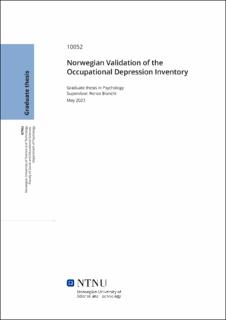| dc.contributor.advisor | Bianchi, Renzo | |
| dc.contributor.author | Gjævran, Synøve Marie | |
| dc.date.accessioned | 2023-07-04T17:20:26Z | |
| dc.date.available | 2023-07-04T17:20:26Z | |
| dc.date.issued | 2023 | |
| dc.identifier | no.ntnu:inspera:146342237:51467533 | |
| dc.identifier.uri | https://hdl.handle.net/11250/3075808 | |
| dc.description.abstract | Nylig forskning på arbeidshelse har uttrykt behovet for nye tilnærminger til å vurdere arbeidsrelaterte plager. I denne sammenhengen ble Occupational Depression Inventory (ODI) opprettet for å vurdere depressive symptomer som folk tilskriver arbeidet sitt. Denne studien hadde som mål å validere ODI i Norge og utforske korrelatene til yrkesrelatert depresjon i mer detalj. Vårt utvalg besto av 485 sysselsatte personer i Norge (68 % kvinner). Vi undersøkte datasettet vårt ved å bruke faktoranalyse så vel som korrelasjonsanalyse med Pearsons r. Resultatene indikerte at ODI har høy faktoriell validitet og sterk reliabilitet. Korrelasjonsanalyse støttet kriterievaliditeten og diskriminantvaliditeten til ODI. Yrkesrelatert depresjon var assosiert, i forventet retning, med vold på arbeidsplassen, sykefravær, utstøting på arbeidsplassen og sosioøkonomisk optimisme, samt årsaksnøytral depresjon. Vi konkluderer med at ODI trygt kan brukes til å vurdere arbeidsrelaterte plager i norsk kontekst. | |
| dc.description.abstract | Recent research on occupational health has expressed the need for new approaches to assessing work-related distress. In this context, the Occupational Depression Inventory (ODI) was created to assess depressive symptoms that people attribute to their work. The current study aimed to validate the ODI in Norway and explore the correlates of occupational depression in further detail. Our sample consisted of 485 employed individuals in Norway (68% female). We examined our dataset using common-practice factor analysis as well as correlation analysis using Pearson’s r. The results indicated that the ODI has high factorial validity and strong reliability. Correlation analysis supported the concurrent and discriminant validity of the ODI. Occupational depression was associated, in the expected direction, with workplace violence, sick leave, workplace ostracism, and socioeconomic optimism, as well as measures of cause-neutral depression. We conclude that the ODI can be confidently used for assessing work-related distress in the Norwegian context. | |
| dc.language | eng | |
| dc.publisher | NTNU | |
| dc.title | Norwegian Validation of the Occupational Depression Inventory | |
| dc.type | Bachelor thesis | |
